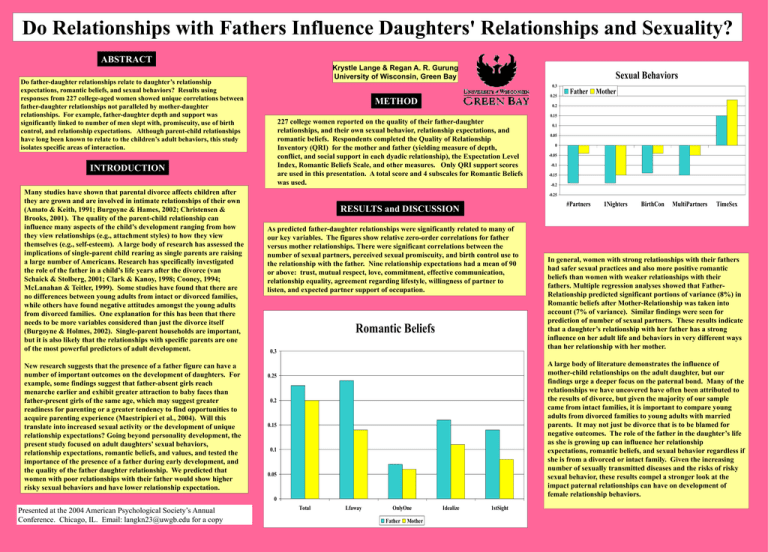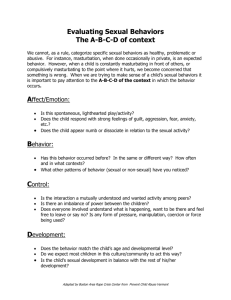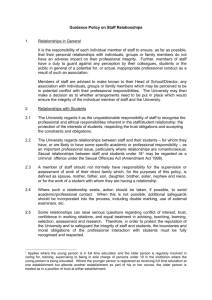
Do Relationships with Fathers Influence Daughters' Relationships and Sexuality?
ABSTRACT
Krystle Lange & Regan A. R. Gurung
University of Wisconsin, Green Bay
Do father-daughter relationships relate to daughter’s relationship
expectations, romantic beliefs, and sexual behaviors? Results using
responses from 227 college-aged women showed unique correlations between
father-daughter relationships not paralleled by mother-daughter
relationships. For example, father-daughter depth and support was
significantly linked to number of men slept with, promiscuity, use of birth
control, and relationship expectations. Although parent-child relationships
have long been known to relate to the children’s adult behaviors, this study
isolates specific areas of interaction.
0.3
New research suggests that the presence of a father figure can have a
number of important outcomes on the development of daughters. For
example, some findings suggest that father-absent girls reach
menarche earlier and exhibit greater attraction to baby faces than
father-present girls of the same age, which may suggest greater
readiness for parenting or a greater tendency to find opportunities to
acquire parenting experience (Maestripieri et al., 2004). Will this
translate into increased sexual activity or the development of unique
relationship expectations? Going beyond personality development, the
present study focused on adult daughters’ sexual behaviors,
relationship expectations, romantic beliefs, and values, and tested the
importance of the presence of a father during early development, and
the quality of the father daughter relationship. We predicted that
women with poor relationships with their father would show higher
risky sexual behaviors and have lower relationship expectation.
0.25
METHOD
Mother
0.2
227 college women reported on the quality of their father-daughter
relationships, and their own sexual behavior, relationship expectations, and
romantic beliefs. Respondents completed the Quality of Relationship
Inventory (QRI) for the mother and father (yielding measure of depth,
conflict, and social support in each dyadic relationship), the Expectation Level
Index, Romantic Beliefs Scale, and other measures. Only QRI support scores
are used in this presentation. A total score and 4 subscales for Romantic Beliefs
was used.
0.1
0.05
0
-0.05
-0.1
-0.15
-0.2
-0.25
#Partners
RESULTS and DISCUSSION
As predicted father-daughter relationships were significantly related to many of
our key variables. The figures show relative zero-order correlations for father
versus mother relationships. There were significant correlations between the
number of sexual partners, perceived sexual promiscuity, and birth control use to
the relationship with the father. Nine relationship expectations had a mean of 90
or above: trust, mutual respect, love, commitment, effective communication,
relationship equality, agreement regarding lifestyle, willingness of partner to
listen, and expected partner support of occupation.
Romantic Beliefs
0.3
1Nighters
BirthCon
MultiPartners
TimeSex
In general, women with strong relationships with their fathers
had safer sexual practices and also more positive romantic
beliefs than women with weaker relationships with their
fathers. Multiple regression analyses showed that FatherRelationship predicted significant portions of variance (8%) in
Romantic beliefs after Mother-Relationship was taken into
account (7% of variance). Similar findings were seen for
prediction of number of sexual partners. These results indicate
that a daughter’s relationship with her father has a strong
influence on her adult life and behaviors in very different ways
than her relationship with her mother.
A large body of literature demonstrates the influence of
mother-child relationships on the adult daughter, but our
findings urge a deeper focus on the paternal bond. Many of the
relationships we have uncovered have often been attributed to
the results of divorce, but given the majority of our sample
came from intact families, it is important to compare young
adults from divorced families to young adults with married
parents. It may not just be divorce that is to be blamed for
negative outcomes. The role of the father in the daughter’s life
as she is growing up can influence her relationship
expectations, romantic beliefs, and sexual behavior regardless if
she is from a divorced or intact family. Given the increasing
number of sexually transmitted diseases and the risks of risky
sexual behavior, these results compel a stronger look at the
impact paternal relationships can have on development of
female relationship behaviors.
0.25
0.2
0.15
0.1
0.05
0
Presented at the 2004 American Psychological Society’s Annual
Conference. Chicago, IL. Email: langkn23@uwgb.edu for a copy
Father
0.15
INTRODUCTION
Many studies have shown that parental divorce affects children after
they are grown and are involved in intimate relationships of their own
(Amato & Keith, 1991; Burgoyne & Hames, 2002; Christensen &
Brooks, 2001). The quality of the parent-child relationship can
influence many aspects of the child’s development ranging from how
they view relationships (e.g., attachment styles) to how they view
themselves (e.g., self-esteem). A large body of research has assessed the
implications of single-parent child rearing as single parents are raising
a large number of Americans. Research has specifically investigated
the role of the father in a child’s life years after the divorce (van
Schaick & Stolberg, 2001; Clark & Kanoy, 1998; Cooney, 1994;
McLanahan & Teitler, 1999). Some studies have found that there are
no differences between young adults from intact or divorced families,
while others have found negative attitudes amongst the young adults
from divorced families. One explanation for this has been that there
needs to be more variables considered than just the divorce itself
(Burgoyne & Holmes, 2002). Single-parent households are important,
but it is also likely that the relationships with specific parents are one
of the most powerful predictors of adult development.
Sexual Behaviors
Total
Lfaway
OnlyOne
Father
Mother
Idealize
1stSight





